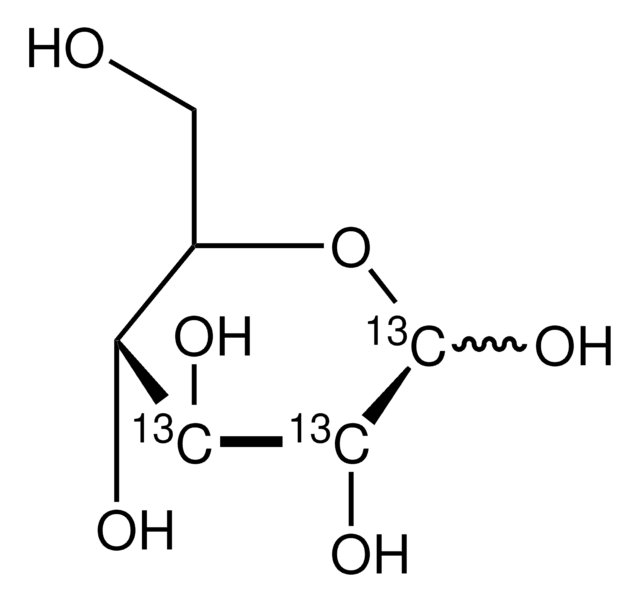453196
D-Glucose-1,6-13C2
≥99 atom % 13C, ≥99% (CP)
Synonym(s):
Labeled Glucose, Dextrose-1,6-13C2
About This Item
Recommended Products
isotopic purity
≥99 atom % 13C
Quality Level
Assay
≥99% (CP)
form
powder
optical activity
[α]25/D +52.0°, c = 2 in H2O (trace NH4OH)
mp
150-152 °C
mass shift
M+2
SMILES string
O[13CH2][C@@H]1O[13CH2][C@@H](O)[C@H](O)[C@H]1O.O
InChI
1S/C6H12O6/c7-1-3(9)5(11)6(12)4(10)2-8/h1,3-6,8-12H,2H2/t3-,4+,5+,6+/m0/s1/i1+1,2+1
InChI key
GZCGUPFRVQAUEE-OFAMVBKFSA-N
Packaging
Storage Class Code
11 - Combustible Solids
WGK
WGK 1
Flash Point(F)
Not applicable
Flash Point(C)
Not applicable
Personal Protective Equipment
Choose from one of the most recent versions:
Already Own This Product?
Find documentation for the products that you have recently purchased in the Document Library.
Customers Also Viewed
Articles
Isotopic Labeling for NMR Spectroscopy of Biological Solids;
Review the 10 steps of glycolysis in the Embden-Meyerhof-Parnas glycolytic pathway. Easily compare reaction stages and buy the enzymes for your life science research.
Review the 10 steps of glycolysis in the Embden-Meyerhof-Parnas glycolytic pathway. Easily compare reaction stages and buy the enzymes for your life science research.
Review the 10 steps of glycolysis in the Embden-Meyerhof-Parnas glycolytic pathway. Easily compare reaction stages and buy the enzymes for your life science research.
Our team of scientists has experience in all areas of research including Life Science, Material Science, Chemical Synthesis, Chromatography, Analytical and many others.
Contact Technical Service













